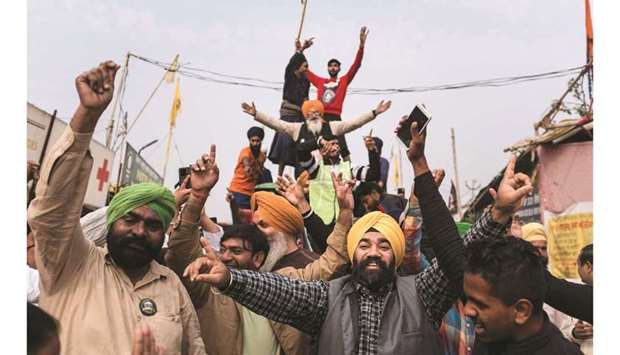Indian Prime Minister Narendra Modi may have caved in to farmers’ demands that he scraps laws they say threaten their livelihoods.
But reaction to the shock U-turn in India’s rural north, where Modi’s Bharatiya Janata Party (BJP) faces key elections next year, has been less than positive, a worrying sign for a leader seeking to maintain his grip on national politics.
In the village of Mohraniya, some 500km by road east of the capital New Delhi and located in India’s most populous state of Uttar Pradesh, farmer Guru Sevak Singh said that he and others like him lost faith in Modi and his party. “Today Prime Minister Modi realised that he was committing blunder, but it took him a year to recognise this and only because he now knows farmers will not vote for his party ever again,” said Singh.
For the young farmer, the matter is deeply personal.
Singh’s 19-year-old brother Guruvinder was killed in October when a car ploughed into a crowd protesting against the farm legislation, one of eight people who died in a spate of violence related to the farmers’ uprising.
Thousands of agricultural workers have protested outside the capital New Delhi and beyond for more than a year, shrugging off the pandemic to disrupt traffic and pile pressure on Modi and the BJP who say the new laws were key to modernising the sector.
“Today I can announce that my brother is a martyr,” Singh said as he held a picture of his dead brother.
“My brother is among those brave farmers who sacrificed their lives to prove that the government was implementing laws to destroy the agrarian economy,” he added.
Around him were several police officers, who Singh said were provided after his brother and three others were killed by the car.
Ashish Mishra, son of junior home minister Ajay, is in police custody in relation to the incident. Ajay Mishra Teni said at the time that his son was not at the site and that a car driven by “our driver” had lost control and hit the farmers after “miscreants” pelted it with stones and attacked it with sticks and swords.
In 2020, Modi’s government passed three farm laws in a bid to overhaul the agriculture sector that employs about 60% of India’s workforce but is deeply inefficient, in debt and prone to pricing wars.
Angry farmers took to the streets, saying the reforms put their jobs at risk and handed control over crops and prices to private corporations.
The resulting protest movement became one of the country’s biggest and most protracted.
Leaders of six farmer unions who spearheaded the movement in Uttar Pradesh and Punjab states said they would not forgive a government that labelled protesting farmers as terrorists and anti-nationals.
“Farmers were beaten with sticks, rods and detained for demanding legitimate rights...farmers were mowed down by a speeding car belonging to a minister’s family...tell me how can we forget it all?” said Sudhakar Rai, a senior member of a farmers’ union in Uttar Pradesh.
Rai said at least 170 farmers were killed during anti-farm law protests across the country.
There are no official data to verify his claims.
A senior BJP member who declined to be named said the decision to repeal the laws was taken by Modi after he consulted a top farmers’ association affiliated to his party.
Elections trump economics, say analysts
Elections trumped the urgency for agricultural reform in Indian Prime Minister Narendra Modi’s surprise decision yesterday to repeal new farm laws, economists and political analysts said. Although far from perfect, the three laws passed in September 2020 which Modi now plans to scrap would have made a start at liberalising India’s enormous but hugely inefficient farming sector. “The government has made an electoral calculation,” professor Harsh V Pant, an Indian author and analyst, said. Modi “instinctively, intuitively” felt the political costs of his reforms were higher than their economic benefit, he added - making the subject “untouchable” going forward. “If even Modi, with his electoral mandate, is struggling, then I don’t think anyone in the near future will be able to get the same mandate or tackle these issues,” he said. “Obviously, this decision puts electoral politics front and centre,” Nistula Hebbar, political editor with The Hindu. “The BJP under Modi is willing to be very pragmatic for its electoral success.” “If they lose Uttar Pradesh everything will be bad for them going forward - from the morale of the party supporters, the opposition’s morale, the election of next Indian president and Modi’s 2024 re-election bid,” she added.

Farmers celebrate after Prime Minister Modi announced the repeal of three agricultural reform laws that sparked almost a year of huge protests by farmers across the country in Singhu, New Delhi, on Friday.
